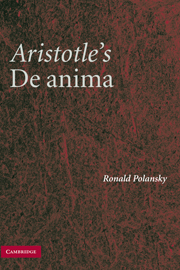Book contents
- Frontmatter
- Contents
- Preface
- List of Abbreviations
- Introduction
- COMMENTARY ON DE ANIMA: : Book 1
- COMMENTARY ON DE ANIMA: Book 2
- COMMENTARY ON DE ANIMA: Book 3
- 1 In the World As It Is There Can Be but the Five Senses
- 2 What Allows for Perceiving That We Perceive; Sense Joins in a Common Power so That the Five Senses Are Subfaculties of a Central Sense Faculty
- 3 Distinguishing Sense and Thought; What Is Phantasia?
- 4 What Is Mind as That Capable of Thinking All Things
- 5 What Enables Thinking to Occur
- 6 The Sorts of Intelligible Objects
- 7 Phantasia Has a Role in All Thinking
- 8 That Mind Can Think All Things
- 9 There Is a Capacity for Progressive Motion
- 10 The Desiderative Capacity Is the Primary Cause of Progressive Motion
- 11 Even the Simplest Animals Have Indefinite Phantasia, and Calculative Phantasia Fits the Account of Progressive Motion
- 12 The Necessary Order of the Faculties of Soul
- 13 The Sort of Body Requisite to Support the Order of the Faculties of Soul
- Bibliography
- Index
6 - The Sorts of Intelligible Objects
Published online by Cambridge University Press: 18 December 2009
- Frontmatter
- Contents
- Preface
- List of Abbreviations
- Introduction
- COMMENTARY ON DE ANIMA: : Book 1
- COMMENTARY ON DE ANIMA: Book 2
- COMMENTARY ON DE ANIMA: Book 3
- 1 In the World As It Is There Can Be but the Five Senses
- 2 What Allows for Perceiving That We Perceive; Sense Joins in a Common Power so That the Five Senses Are Subfaculties of a Central Sense Faculty
- 3 Distinguishing Sense and Thought; What Is Phantasia?
- 4 What Is Mind as That Capable of Thinking All Things
- 5 What Enables Thinking to Occur
- 6 The Sorts of Intelligible Objects
- 7 Phantasia Has a Role in All Thinking
- 8 That Mind Can Think All Things
- 9 There Is a Capacity for Progressive Motion
- 10 The Desiderative Capacity Is the Primary Cause of Progressive Motion
- 11 Even the Simplest Animals Have Indefinite Phantasia, and Calculative Phantasia Fits the Account of Progressive Motion
- 12 The Necessary Order of the Faculties of Soul
- 13 The Sort of Body Requisite to Support the Order of the Faculties of Soul
- Bibliography
- Index
Summary
Having completed his general account of the nature of mind and the way this makes thinking possible, Aristotle considers in some detail the basic objects of thought: those about which we think truly as the special sensibles are those perceived truly. His treatment of intellect further resembles the inquiry into sense perception, since, after treating the nature of sense in ii 5, he discusses the various sensible objects in some detail in ii 6, and now after dealing with mind in iii 4–5, he takes up the objects of thought in iii 6. As in ii 5 there is some preliminary consideration of the sensible objects (see 417b19–28), so in iii 4.429b10–22 there is brief attention to the objects of intellection, though the fuller treatment occurs here in iii 6. Also the way thought draws its objects together as one will receive attention in iii 6, somewhat comparable to sense's drawing things together as he discusses in iii 2. Aristotle has been speaking rather as if all knowledge were the theoretical knowledge of essences. Thought may be about these primarily, but it also extends to more objects. Presumably he supposes all thinking explicable, much as all sense-perceiving, if he can account for its most basic kinds and objects. In addition, by showing the possible breadth of thought, he begins to justify his initial assumption from iii 4 that thought can think all things.
- Type
- Chapter
- Information
- Aristotle's De AnimaA Critical Commentary, pp. 473 - 480Publisher: Cambridge University PressPrint publication year: 2007



